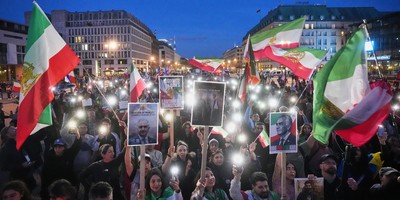"What Would Winston Do?"
So asks Newsweek's cover, which features a full-length photo of the prime minister his people voted the greatest Briton of them all.
Quite a tribute, when one realizes Churchill's career coincides with the collapse of the British empire and the fall of his nation from world pre-eminence to third-rate power.
That the Newsweek cover was sparked by my book "Churchill, Hitler and The Unnecessary War" seems apparent, as one of the three essays, by Christopher Hitchens, was a scathing review. Though in places complimentary, Hitchens charmingly concludes: This book "stinks."
Understandable. No Brit can easily concede my central thesis: The Brits kicked away their empire. Through colossal blunders, Britain twice declared war on a Germany that had not attacked her and did not want war with her, fought for 10 bloody years and lost it all.
Unable to face the truth, Hitchens seeks solace in old myths.
We had to stop Prussian militarism in 1914, says Hitchens. "The Kaiser's policy shows that Germany was looking for a chance for war all over the globe."
Nonsense. If the Kaiser were looking for a war he would have found it. But in 1914, he had been in power for 25 years, was deep into middle age but had never fought a war nor seen a battle.
From Waterloo to World War I, Prussia fought three wars, all in one seven-year period, 1864 to 1871. Out of these wars, she acquired two duchies, Schleswig and Holstein, and two provinces, Alsace and Lorraine. By 1914, Germany had not fought a war in two generations.
Recommended
Does that sound like a nation out to conquer the world?
As for the Kaiser's bellicose support for the Boers, his igniting the Agadir crisis in 1905, his building of a great fleet, his seeking of colonies in Africa, he was only aping the British, whose approbation and friendship he desperately sought all his life and was ever denied.
In every crisis the Kaiser blundered into, including his foolish "blank cheque" to Austria after Serb assassins murdered the heir to the Austrian throne, the Kaiser backed down or was trying to back away when war erupted.
Even Churchill, who before 1914 was charging the Kaiser with seeking "the dominion of the world," conceded, "History should ... acquit William II of having plotted and planned the World War."
What of World War II? Surely, it was necessary to declare war to stop Adolf Hitler from conquering the world and conducting the Holocaust.
Yet consider. Before Britain declared war on him, Hitler never demanded return of any lands lost at Versailles to the West. Northern Schleswig had gone to Denmark in 1919, Eupen and Malmedy had gone to Belgium, Alsace and Lorraine to France.
Why did Hitler not demand these lands back? Because he sought an alliance, or at least friendship, with Great Britain and knew any move on France would mean war with Britain -- a war he never wanted.
If Hitler were out to conquer the world, why did he not build a great fleet? Why did he not demand the French fleet when France surrendered? Germany had to give up its High Seas Fleet in 1918.
Why did he build his own Maginot Line, the Western Wall, in the Rhineland, if he meant all along to invade France?
If he wanted war with the West, why did he offer peace after Poland and offer to end the war, again, after Dunkirk?
That Hitler was a rabid anti-Semite is undeniable. "Mein Kampf" is saturated in anti-Semitism. The Nuremberg Laws confirm it. But for the six years before Britain declared war, there was no Holocaust, and for two years after the war began, there was no Holocaust.
Not until midwinter 1942 was the Wannsee Conference held, where the Final Solution was on the table.
That conference was not convened until Hitler had been halted in Russia, was at war with America and sensed doom was inevitable. Then the trains began to roll.
And why did Hitler invade Russia? This writer quotes Hitler 10 times as saying that only by knocking out Russia could he convince Britain it could not win and must end the war.
Hitchens mocks this view, invoking the Hitler-madman theory.
"Could we have a better definition of derangement and megalomania than the case of a dictator who overrules his own generals and invades Russia in wintertime ... ?"
Christopher, Hitler invaded Russia on June 22.
The Holocaust was not a cause of the war, but a consequence of the war. No war, no Holocaust.
Britain went to war with Germany to save Poland. She did not save Poland. She did lose the empire. And Josef Stalin, whose victims outnumbered those of Hitler 1,000 to one as of September 1939, and who joined Hitler in the rape of Poland, wound up with all of Poland, and all the Christian nations from the Urals to the Elbe.
The British Empire fought, bled and died, and made Eastern and Central Europe safe for Stalinism. No wonder Winston Churchill was so melancholy in old age. No wonder Christopher rails against the book. As T.S. Eliot observed, "Mankind cannot bear much reality."

























Join the conversation as a VIP Member